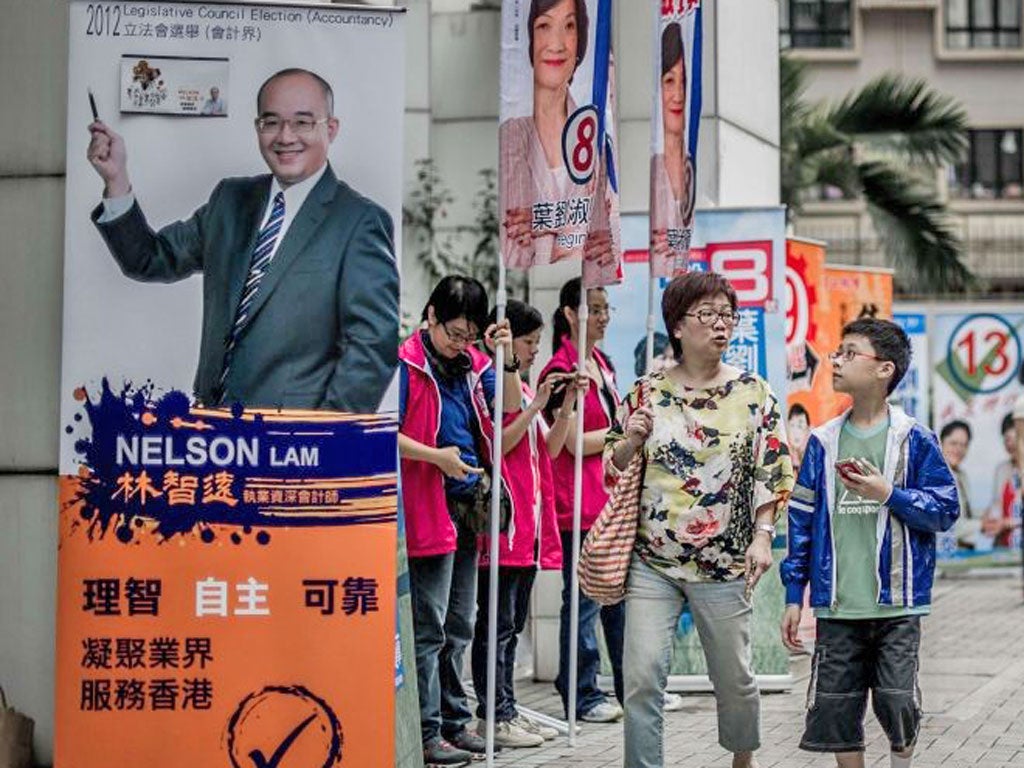Hong Kong goes to the polls to reject interference by Beijing
Election comes after new 'brainwashing' pro-Chinese communist education reforms are dropped

Your support helps us to tell the story
From reproductive rights to climate change to Big Tech, The Independent is on the ground when the story is developing. Whether it's investigating the financials of Elon Musk's pro-Trump PAC or producing our latest documentary, 'The A Word', which shines a light on the American women fighting for reproductive rights, we know how important it is to parse out the facts from the messaging.
At such a critical moment in US history, we need reporters on the ground. Your donation allows us to keep sending journalists to speak to both sides of the story.
The Independent is trusted by Americans across the entire political spectrum. And unlike many other quality news outlets, we choose not to lock Americans out of our reporting and analysis with paywalls. We believe quality journalism should be available to everyone, paid for by those who can afford it.
Your support makes all the difference.Hong Kong voters were expected to give a strong vote of confidence to the territory's pro-democracy movement after legislative elections yesterday that play a major role in determining the eventual shape of the full democracy that Beijing has promised the former Crown colony.
The elections to the 70-seat Legislative Council came shortly after the Chief Executive Leung Chun-ying, who is seen as pro-Beijing and rumoured to be a member of the Communist Party, abandoned a controversial plan to introduce a new compulsory school curriculum, which critics said was a bald attempt to brainwash the public with Chinese Communist Party principles.
"Many people have remarked how this election has been a referendum on the new administration, and a chance to say no to Beijing," said Willy Wo-Lap Lam, an adjunct professor of history at the Chinese University of Hong Kong, speaking after polls closed. "Plus Beijing's overt interference in Hong Kong has given rise to concerns among the middle class. Many people have noted Beijing's interference is becoming more overt and aggressive," said Professor Lam, a former China editor of the South China Morning Post.
The elections had a higher degree of public representation than previous polls, with the public voting for more than half the seats. Voters were choosing 40 representatives, while 30 others were chosen by business and special interest groups, which tend to favour Beijing.
In previous elections the seats were evenly split, but 10 new seats have been added this time and they include five so-called "super seats" that all 3.5 million registered voters can choose.
The ballot attracted a higher turnout too – reaching 53 per cent, up from up from 45 per cent four years ago.
The amount of support voters give to pro-democracy and pro-Beijing camps is an indicator of the appetite for political reform in Hong Kong.
Under the terms of the Basic Law, the mini-constitution introduced in Hong Kong as part of the terms of the return of the territory to China in 1997, Beijing has pledged that Hong Kong can elect its own leader in 2017 and all legislators by 2020 at the earliest.
However, no formal plan has been laid out, and Legislative Council members elected in yesterday's polls will help shape the arrangements for those future elections.
Mr Leung, a former government adviser and a Hong Kong-born surveyor, was elected Chief Executive in March after a campaign marred by scandal and public unhappiness at a lack of representation.
He is the last Chief Executive to be chosen by a 1,193-member committee comprising billionaires, lawmakers and representatives from industry groups.
Dissatisfaction at the way the government deals with China has risen to the highest level in eight years, according to a survey by the Hong Kong Transition Project.
"Education has been the No 1 concern. It definitely played a big role in this election," said project leader Michael DeGolyer, a professor at the Hong Kong Baptist University.
The education plan led to huge protests with 120,000 people taking to the streets on Friday, and 100,000 on Saturday, organisers said. Alarmed by the public outcry, the government held urgent consultations with schools, parents and teachers, and opted instead to make the new plan voluntary.
"This was not just about education," said Mr Lam. "It was a symbol of Leung Chun-ying's administration's attempt to impose Beijing's values. Beijing has been interfering in this election in a big way, which goes against the Basic Law."
Hong Kongers have grown increasingly wary of Beijing's influence, especially in the way that property prices have spiralled out of control because of the growing influx of rich mainlanders buying up apartments.
There have also been complaints about rising corruption since 1997, and a widening wealth gap between rich and poor.
In July, more than 100,000 Hong Kong residents marched through the streets to send a message to Beijing that Hong Kong values its autonomy and does not want to be its puppet.
Join our commenting forum
Join thought-provoking conversations, follow other Independent readers and see their replies
Comments